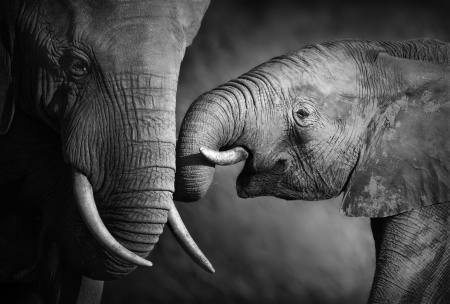
An animal with a soul? Or just some piano keys?
December 9, 2015
Unbeknownst to us, under the hulking mass of elephants, reside emotions, feelings and personality traits strikingly similar to those of humans.
According to pbs.org, elephants “are among the most exuberantly expressive of creatures. Joy, anger, grief, compassion, love; the finest emotions reside within these hulking masses.”
Though chimps are obviously directly related to humans physically, elephants possess many of the same emotional traits as humans. In a study conducted at Emory University, researchers discovered that one of the reasons elephants contain so many human-like emotions is because of their ability to have a sense of self.
Humans, apes and dolphins are other animals who are known for being capable of having a sense of self. The Emory University study examined whether an animal could recognize images in a mirror and connect those images to his/her own life.
In the study, when shown a mirror, the elephants investigated it by “touching it with their trunks to see if it was really another elephant, exploring the back side to see if there was another elephant hiding there, or inspecting some part of herself to see if the reflection copied her,” according to the Huffington Post. One elephant, Happy, passed the “mark test” meaning she tapped the mirror where a white X had been placed on her body so that it was only visible in the mirror.
In correlation to their sense of self, elephants are empathetic. According to the Huffington Post, researchers at an elephant park in Thailand used 26 elephants in groups of six to determine if an elephant would comfort another suffering elephant. The study found that when a natural circumstance presented itself and made an elephant nervous, the other elephants would make chirping noises and embrace the distraught elephant in a “hug.” Like apes, birds, wolves and humans, elephants can tell when one of their own is distressed based on their body language.
Having a sense of self enables an animal to compare the actions and body language of one of their own to themselves and realize that an animal is in distress.
With empathy comes grief. According to pbs.org, “When an elephant walks past a place that a loved one died he or she will stop and take a silent pause that can last several minutes. While standing over the remains, the elephant may touch the bones of the dead elephant (not the bones of any other species), smelling them, turning them over and caressing the bones with their trunk.”
Though researchers don’t understand this phenomenon, they suspect that because of these actions, elephants have a sense of death. Elephants are also known to bury their dead, covering them in sticks, grass and twigs.
Elephant herds are also matriarchal, showing the bond that elephants can form. The strongest bond is between the mother and the daughter, sustaining itself until the mother dies. The matriarchy is then passed down to the closest relative of the deceased female elephant.
Elephants are capable of working together in both deciding the leader of the herd as well as in everyday tasks, showing another trait seen in elephants: teamwork. In another elephant experiment done in Thailand, elephants were given food that could only be reached by pulling two ends of a robe, making it so one elephant could not do it by himself. All of the animals figured out the pulley system and displayed teamwork.
Because of the human-like traits that elephants possess, researchers suggest that elephants don’t base their actions only on survival; they base them on feelings.